Story by Gergana Krasteva •METRO UK
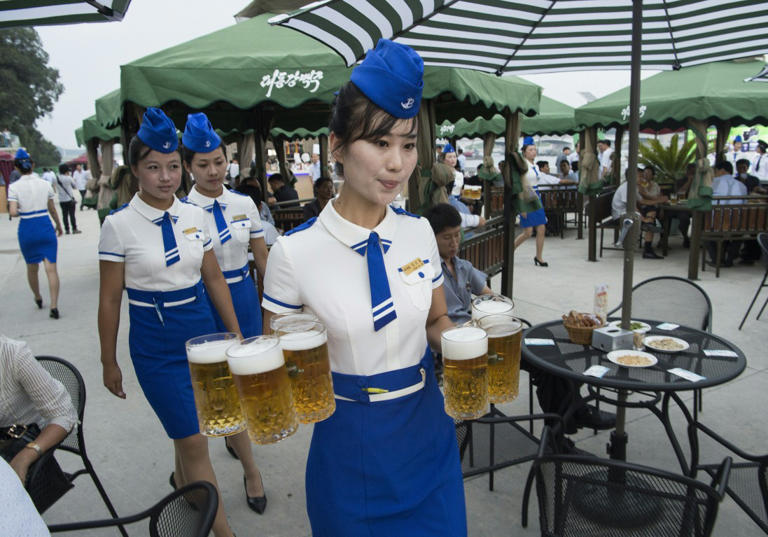
A waitress carrying jugs of beer to guests before the opening of the Pyongyang Taedonggang Beer Festival on the banks of the Taedong river in Pyongyang

A waitress carrying jugs of beer to guests before the opening of the Pyongyang Taedonggang Beer Festival on the banks of the Taedong river in Pyongyang
(Picture: Getty)© Provided by Metro
North Korea is not the first country – a conservative estimate by any means – that comes to mind in the global rankings of beer production, but it seems to be working hard to change that.
The Taedonggang Beer Factory, which first opened doors in Pyongyang some 21 years ago, was honoured as one of the top ten businesses in the secretive state.
The regime’s quest to brew decent beer began in 2000.
After scouring Europe for a suitable plant, talks kicked off with Ushers brewery of Britain about acquiring their site in Trowbridge, Wiltshire, which had shut down.
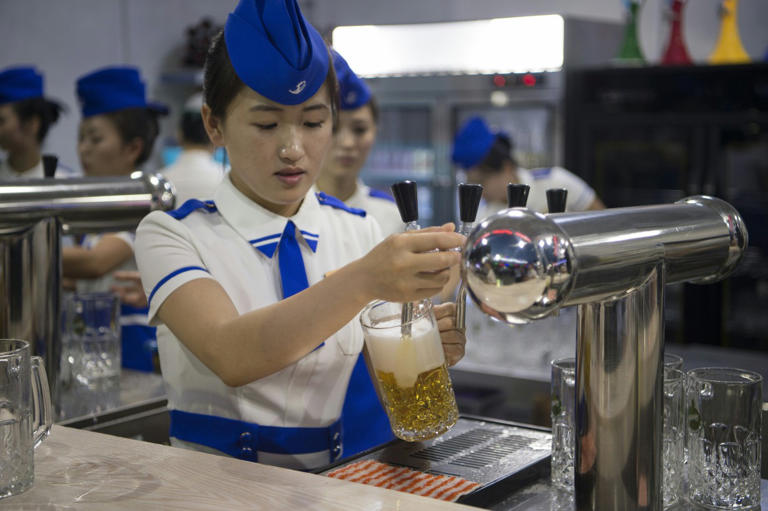
North Korea’s version of Oktoberfest
North Korea is not the first country – a conservative estimate by any means – that comes to mind in the global rankings of beer production, but it seems to be working hard to change that.
The Taedonggang Beer Factory, which first opened doors in Pyongyang some 21 years ago, was honoured as one of the top ten businesses in the secretive state.
The regime’s quest to brew decent beer began in 2000.
After scouring Europe for a suitable plant, talks kicked off with Ushers brewery of Britain about acquiring their site in Trowbridge, Wiltshire, which had shut down.

North Korea’s version of Oktoberfest
(Picture: Getty)© Provided by Metro
The North Koreans took apart the brewery, shipping it brick by brick piece to the capital and reassembled it under the banner of its Taedonggang Beer Factory.
Decades later, the factory was praised for its contribution to ‘the five-year plan for national economic development’ alongside other firms, The Telegraph reported.
The sale was only permitted after the British government was assurances that the machinery could not be converted to produce chemical weapons.
Gary Todd, who had been head brewer at Ushers before it folded, found himself in the unlikely scenario of training up North Korean staff so the plant could be rebuilt 5,200 miles away.
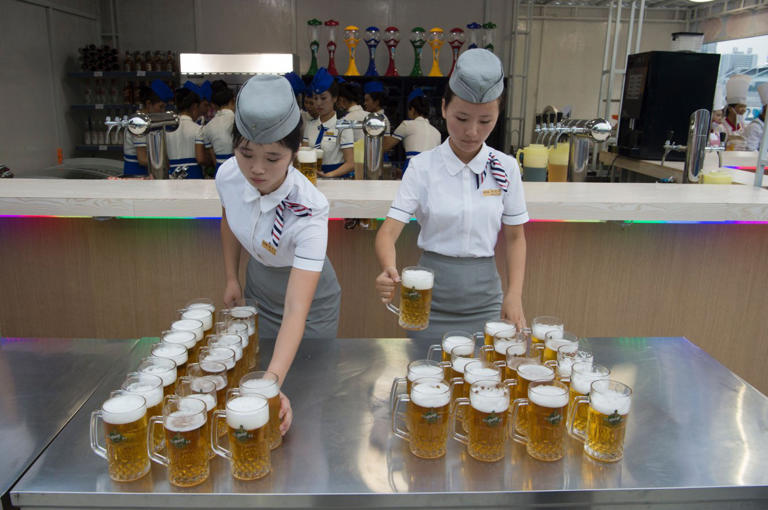
Waitresses lining up pints of Taedonggang beer
The North Koreans took apart the brewery, shipping it brick by brick piece to the capital and reassembled it under the banner of its Taedonggang Beer Factory.
Decades later, the factory was praised for its contribution to ‘the five-year plan for national economic development’ alongside other firms, The Telegraph reported.
The sale was only permitted after the British government was assurances that the machinery could not be converted to produce chemical weapons.
Gary Todd, who had been head brewer at Ushers before it folded, found himself in the unlikely scenario of training up North Korean staff so the plant could be rebuilt 5,200 miles away.

Waitresses lining up pints of Taedonggang beer
(Picture: Getty)© Provided by Metro
‘I had to effectively give them a crash course in brewing and we spent a lot of time going over the basics, but it seems that they got it because they are up and running over there now’, Mr Todd said.
Mr Todd said he had been able to check on the brewery’s progress a few years ago, when a British journalist brought him back a bottle of its beer from a visit to North Korea.
‘I would have to say that I was pleasantly surprised because I was not sure what they were using for their brewing materials,’ he added.
‘It was slightly oxidised, but the flavour was pretty good, it was quite nice.’
The beer is said to have won ‘great public favor’ and has even built up following in China and South Korea.
It is described to be a full-bodied lager a little on the sweet side, with a slightly bitter aftertaste.
Taedonggang’s origin story is said to begin with Kim Jong-il, who was succeeded by his son Kim Jong Un, whose fondness for expensive brandy and wines was well known.
In June 2002, the former leader toured the brewery after it started running again.
‘Watching good-quality beer coming out in an uninterrupted flow for a long while, he noted with great pleasure that it has now become possible to supply more fresh beer to people in all seasons,’ the North Korean state-run news agency, KCNA, said of Kim’s tour.
‘I had to effectively give them a crash course in brewing and we spent a lot of time going over the basics, but it seems that they got it because they are up and running over there now’, Mr Todd said.
Mr Todd said he had been able to check on the brewery’s progress a few years ago, when a British journalist brought him back a bottle of its beer from a visit to North Korea.
‘I would have to say that I was pleasantly surprised because I was not sure what they were using for their brewing materials,’ he added.
‘It was slightly oxidised, but the flavour was pretty good, it was quite nice.’
The beer is said to have won ‘great public favor’ and has even built up following in China and South Korea.
It is described to be a full-bodied lager a little on the sweet side, with a slightly bitter aftertaste.
Taedonggang’s origin story is said to begin with Kim Jong-il, who was succeeded by his son Kim Jong Un, whose fondness for expensive brandy and wines was well known.
In June 2002, the former leader toured the brewery after it started running again.
‘Watching good-quality beer coming out in an uninterrupted flow for a long while, he noted with great pleasure that it has now become possible to supply more fresh beer to people in all seasons,’ the North Korean state-run news agency, KCNA, said of Kim’s tour.
North Korea honours brewery shipped brick by brick from Britain
Julian Ryall
Wed, 4 October 2023
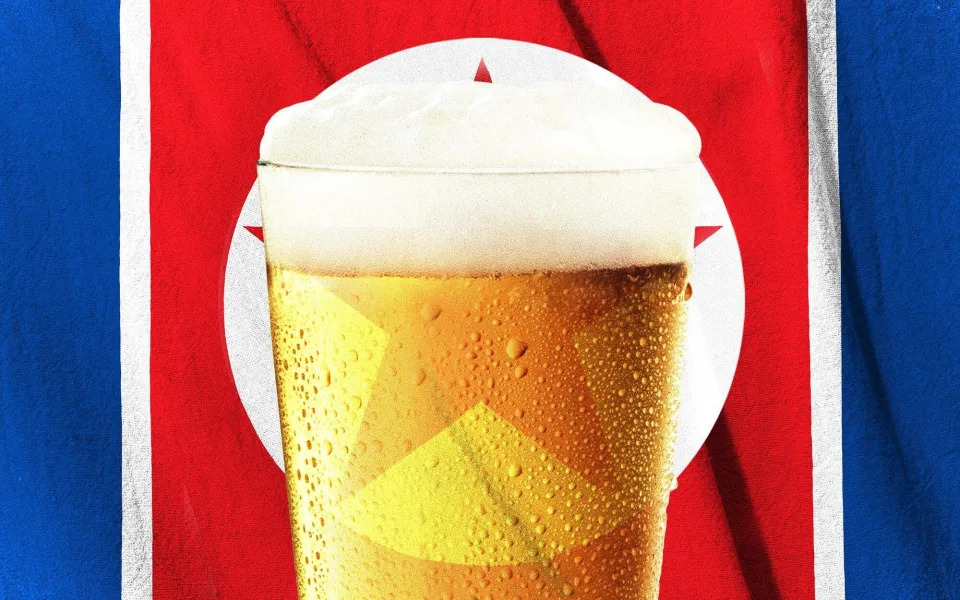
North Korea rebuilt the brewery in Pyongyang brick by brick, with staff given a 'crash course' on how to brew the beer properly
North Korea has honoured a brewery it imported brick by brick from Trowbridge as one of the top 10 businesses in the secretive state.
The Taedonggang Beer Factory was praised for its contribution to “the five-year plan for national economic development” alongside other firms, including one that supplies feed to zoos and a pharmaceutical factory, state media reported.
Opened in the North Korean capital 21 years ago, the brewery had formerly been located in Wiltshire under the ownership of Ushers, a specialist in regional bitters.
It was purchased in 2000 for £1.5 million by North Korea’s government, which then dismantled the 175-year-old property and shipped it piece-by-piece to Pyongyang to be rebuilt, along with 20,000 kegs.
The sale was only permitted after the British Government received assurances that the machinery could not be converted to produce chemical weapons, and involved a delegation of North Koreans travelling to the UK for months of training under brewer Gary Todd’s instruction.
“I had to effectively give them a crash course in brewing and we spent a lot of time going over the basics, but it seems that they got it because they are up and running over there now”, said Mr Todd, who had been the head brewer at the factory until it closed down and was asked to assist with the sale.
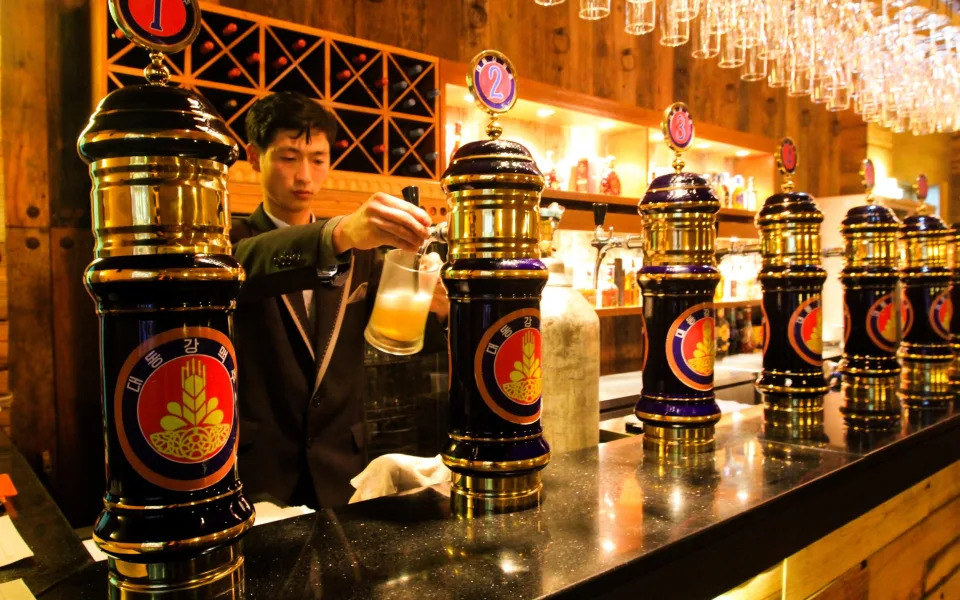
The brewery was purchased in 2000 for £1.5 million by North Korea’s government - Jean H. Lee/Getty Images AsiaPac
Mr Todd said he had been able to check on the brewery’s progress a few years ago, when a British journalist brought him back a bottle of its beer from a visit to North Korea.
“I would have to say that I was pleasantly surprised because I was not sure what they were using for their brewing materials”, he said.
“It was slightly oxidised, but the flavour was pretty good, it was quite nice.”
According to North Korea, the brewery uses water from the natural springs in the Milim district of Pyongyang, as well as barley and hops that are grown domestically.
With an alcohol content of 5.7 per cent, its beers are stronger than the majority of those produced in East Asia.
Its recognition as a leading enterprise this week by Pyongyang cited the brewery’s “production and management on a new scientific basis”.
The Taedonggang Beer Factory marked 20 years of operations in July last year.
The state-run Korea Central News Agency reported at the time that it had been “built under the care of chairman Kim Jong-il”, who was the leader of North Korea when reconstruction of the factory commenced at the beginning of the millennium.
Kim “initiated the construction of the new factory producing beer of the best quality for the people”, reported KCNA.
He was also said to have selected the site for the brewery on the banks of the Taedong River.
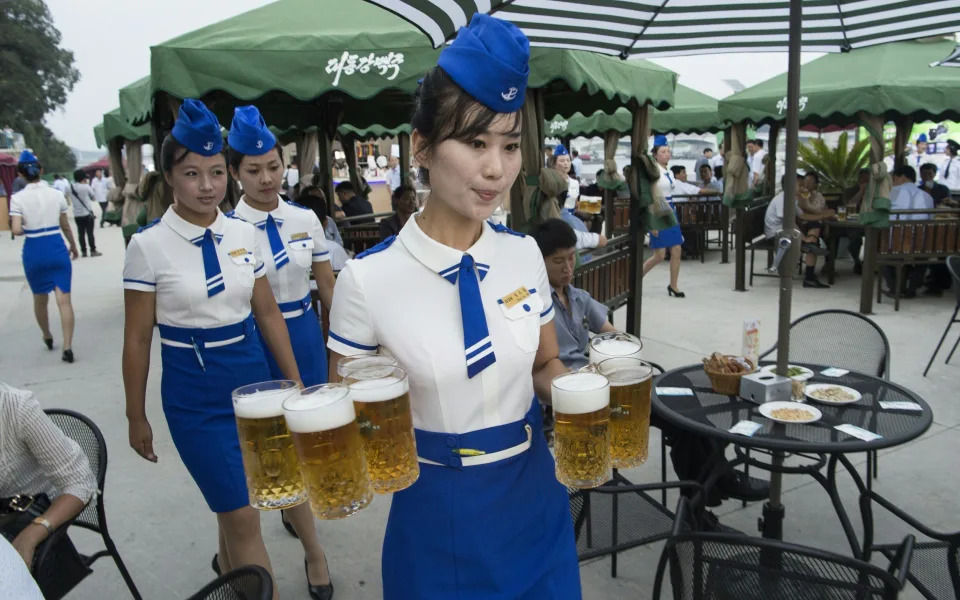
The beer has an alcohol content of 5.7 per cent - KIM WON-JIN/AFP
After Kim’s death in 2011, Kim Jong-un, his son and heir, has been an enthusiastic supporter of the factory.
He has visited the brewery several times to “encourage its officials and workers to further improve the flavour and quality of the beer and thus exalt the honour of the factory as one popular among the people”.
Ordinary North Koreans who enjoy its selection of four beers – including a brown ale and a Pilsner-style lager that is described as being sweet but with a bitter after-taste – remain oblivious to the brewery’s English roots, however.
With little domestic know-how, North Korea had reportedly been scouring Europe for a suitable brewery to produce the regime’s flagship beers for some time before a German agent came across the Ushers property, which had recently been shut down.
After North Korea moved to buy the facility, including all of its fixtures and fittings, it dispatched nationals to the UK to learn the trade from Mr Todd and his colleagues.
They were complete novices, he said, and required comprehensive tutelage.
The training took five months, while the brewery was being dismantled around them, with every brick, light fitting, window and tile carefully boxed up and packed to be sent to North Korea.
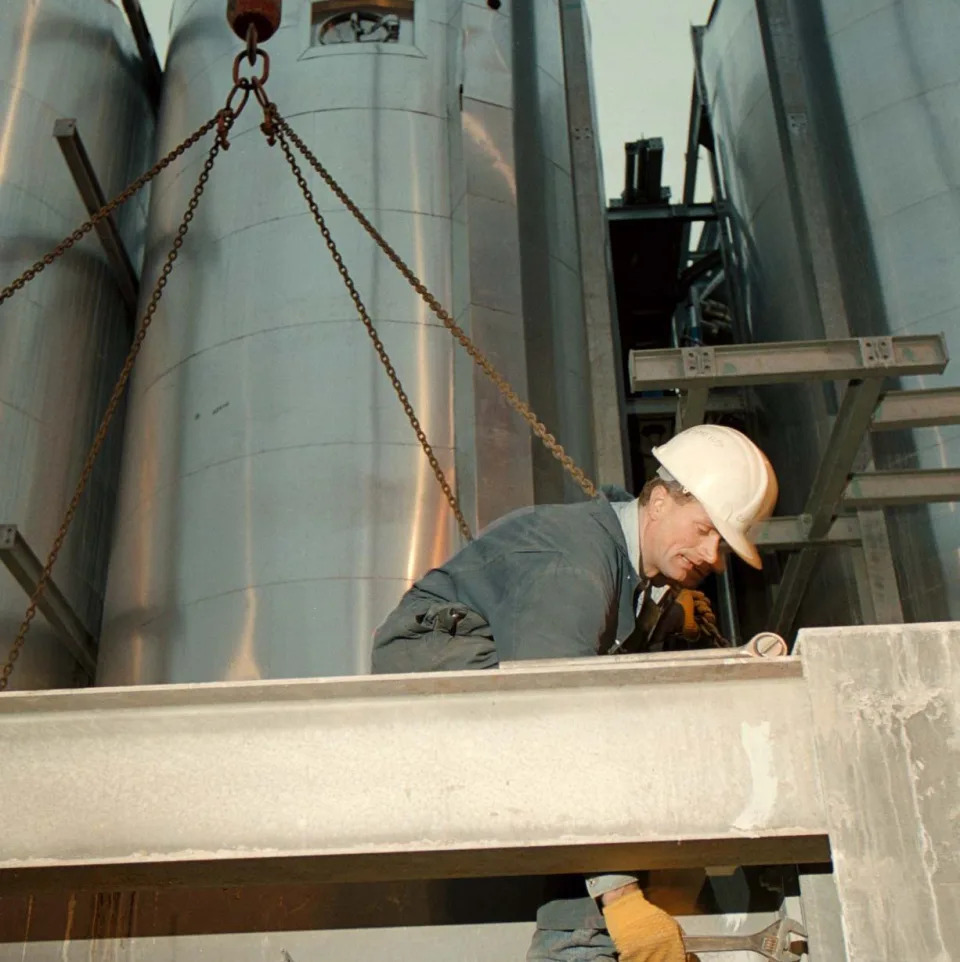
All equipment at the brewery was dismantled and sent to North Korea - John Robertson
“There was quite a large group that arrived, with government officials, translators and ‘brewing experts’ – who had no idea about brewing as they had never had a brewery in North Korea”, said Mr Todd.
But he described being taken aback at the North Koreans’ thoroughness.
“They wanted to rebuild the brewery exactly as it was when it was Ushers, so they took all the brickwork apart one by one, they took all the tiles up off the floor and all the bolts that were sticking out of the floor.
“They were fascinated by the toilet seats, which they had not seen before, and took all the plastic cups out of the vending machine – they were like gold dust to them.”
The North Koreans even insisted on taking an elevator that had been at the centre of the brewery but was not working and had been condemned for 20 years.
Mr Todd and the rest of the British team helping with the project were not able to strike up any personal conversations with their North Korean counterparts as government minders would quickly intervene, he said, and they were all whisked away at the end of each working day, not to be seen again until the following morning.
They certainly never had a night in a Trowbridge pub, he said, which was unfortunate given that they were trying to recreate British brewing culture.
North Koreans catch brewer off-guard
Towards the end of the project, the North Koreans caught Mr Todd off-guard when they asked if he would go with them to Pyongyang to oversee the reconstruction of the brewery and to ensure that it was operating correctly.
It would have been a two-year commitment, at least.
“I said no pretty quickly”, he said. “I had a young family at the time and I didn’t want to take a chance.”
But more than two decades on, he said he would welcome the chance to see it in action.
“I would love to be able to go out and see the brewery in Pyongyang”, said Mr Todd. “But I don’t think that is ever going to happen.”
Julian Ryall
Wed, 4 October 2023

North Korea rebuilt the brewery in Pyongyang brick by brick, with staff given a 'crash course' on how to brew the beer properly
North Korea has honoured a brewery it imported brick by brick from Trowbridge as one of the top 10 businesses in the secretive state.
The Taedonggang Beer Factory was praised for its contribution to “the five-year plan for national economic development” alongside other firms, including one that supplies feed to zoos and a pharmaceutical factory, state media reported.
Opened in the North Korean capital 21 years ago, the brewery had formerly been located in Wiltshire under the ownership of Ushers, a specialist in regional bitters.
It was purchased in 2000 for £1.5 million by North Korea’s government, which then dismantled the 175-year-old property and shipped it piece-by-piece to Pyongyang to be rebuilt, along with 20,000 kegs.
The sale was only permitted after the British Government received assurances that the machinery could not be converted to produce chemical weapons, and involved a delegation of North Koreans travelling to the UK for months of training under brewer Gary Todd’s instruction.
“I had to effectively give them a crash course in brewing and we spent a lot of time going over the basics, but it seems that they got it because they are up and running over there now”, said Mr Todd, who had been the head brewer at the factory until it closed down and was asked to assist with the sale.

The brewery was purchased in 2000 for £1.5 million by North Korea’s government - Jean H. Lee/Getty Images AsiaPac
Mr Todd said he had been able to check on the brewery’s progress a few years ago, when a British journalist brought him back a bottle of its beer from a visit to North Korea.
“I would have to say that I was pleasantly surprised because I was not sure what they were using for their brewing materials”, he said.
“It was slightly oxidised, but the flavour was pretty good, it was quite nice.”
According to North Korea, the brewery uses water from the natural springs in the Milim district of Pyongyang, as well as barley and hops that are grown domestically.
With an alcohol content of 5.7 per cent, its beers are stronger than the majority of those produced in East Asia.
Its recognition as a leading enterprise this week by Pyongyang cited the brewery’s “production and management on a new scientific basis”.
The Taedonggang Beer Factory marked 20 years of operations in July last year.
The state-run Korea Central News Agency reported at the time that it had been “built under the care of chairman Kim Jong-il”, who was the leader of North Korea when reconstruction of the factory commenced at the beginning of the millennium.
Kim “initiated the construction of the new factory producing beer of the best quality for the people”, reported KCNA.
He was also said to have selected the site for the brewery on the banks of the Taedong River.

The beer has an alcohol content of 5.7 per cent - KIM WON-JIN/AFP
After Kim’s death in 2011, Kim Jong-un, his son and heir, has been an enthusiastic supporter of the factory.
He has visited the brewery several times to “encourage its officials and workers to further improve the flavour and quality of the beer and thus exalt the honour of the factory as one popular among the people”.
Ordinary North Koreans who enjoy its selection of four beers – including a brown ale and a Pilsner-style lager that is described as being sweet but with a bitter after-taste – remain oblivious to the brewery’s English roots, however.
With little domestic know-how, North Korea had reportedly been scouring Europe for a suitable brewery to produce the regime’s flagship beers for some time before a German agent came across the Ushers property, which had recently been shut down.
After North Korea moved to buy the facility, including all of its fixtures and fittings, it dispatched nationals to the UK to learn the trade from Mr Todd and his colleagues.
They were complete novices, he said, and required comprehensive tutelage.
The training took five months, while the brewery was being dismantled around them, with every brick, light fitting, window and tile carefully boxed up and packed to be sent to North Korea.

All equipment at the brewery was dismantled and sent to North Korea - John Robertson
“There was quite a large group that arrived, with government officials, translators and ‘brewing experts’ – who had no idea about brewing as they had never had a brewery in North Korea”, said Mr Todd.
But he described being taken aback at the North Koreans’ thoroughness.
“They wanted to rebuild the brewery exactly as it was when it was Ushers, so they took all the brickwork apart one by one, they took all the tiles up off the floor and all the bolts that were sticking out of the floor.
“They were fascinated by the toilet seats, which they had not seen before, and took all the plastic cups out of the vending machine – they were like gold dust to them.”
The North Koreans even insisted on taking an elevator that had been at the centre of the brewery but was not working and had been condemned for 20 years.
Mr Todd and the rest of the British team helping with the project were not able to strike up any personal conversations with their North Korean counterparts as government minders would quickly intervene, he said, and they were all whisked away at the end of each working day, not to be seen again until the following morning.
They certainly never had a night in a Trowbridge pub, he said, which was unfortunate given that they were trying to recreate British brewing culture.
North Koreans catch brewer off-guard
Towards the end of the project, the North Koreans caught Mr Todd off-guard when they asked if he would go with them to Pyongyang to oversee the reconstruction of the brewery and to ensure that it was operating correctly.
It would have been a two-year commitment, at least.
“I said no pretty quickly”, he said. “I had a young family at the time and I didn’t want to take a chance.”
But more than two decades on, he said he would welcome the chance to see it in action.
“I would love to be able to go out and see the brewery in Pyongyang”, said Mr Todd. “But I don’t think that is ever going to happen.”
No comments:
Post a Comment